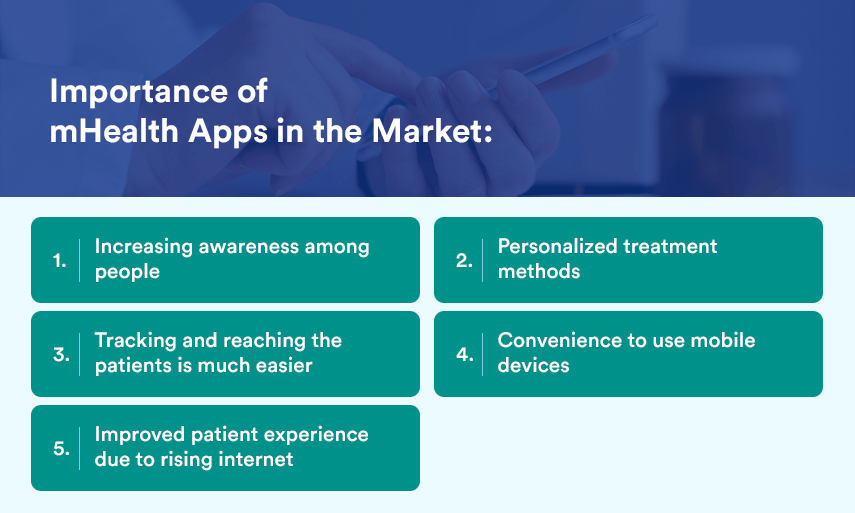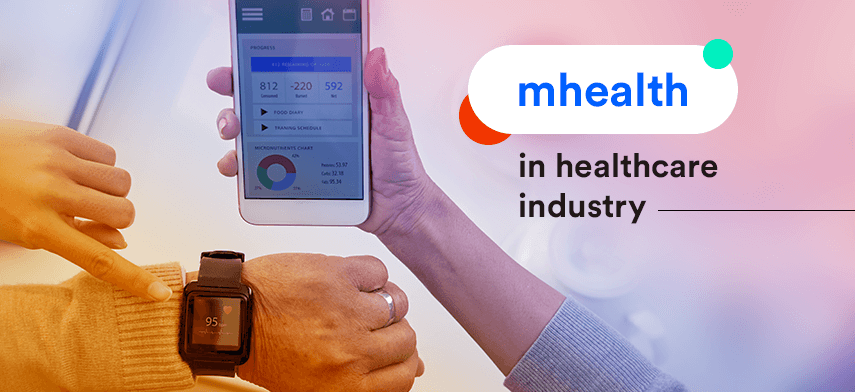Mobile health, abbreviated as mHealth is a collection of everything about public health, medicines, and patient care using mobile devices like tablets, laptops, cellphones, wireless infrastructure, and digital assistance. mHealth comprises multimedia and telecommunication technologies. These days it is mostly accessed through mobile apps. These apps are not only used by the customers or patients, but also by the physicians and the healthcare centers to keep a track of their patients virtually. In fact, the number of hospitals and clinics using mHealth apps are rising notably. In 2019, mobile health devices earned a business of US$37 billion, and this is foreseen to only grow in the upcoming years.
Evolution of mHealth
Since the world is going digital, the results can be seen in the healthcare sector as well. The number of people using mobile devices is increasing day by day. Some of the key evolutions in the mHealth domain are:
- Increased investments by the healthcare stakeholders and rising focus on disease management and preventive care virtually. This prompts the active involvement of patients and doctors in and outside the hospital and medical care.
- Keeping records of the patient’s data for future reference and further diagnosis is now done through cloud computing. With the surging number of patients, this technology has helped the industry to a great extent.
- With the growth in mobile healthcare, a lot of expenses are saved. The timely mobile notifications and updates, the patients who tend to miss their dose of medicines, or physical activities such as taking a walk, drinking water, etc. can be kept in check with mHealth apps. This saves the cost to the patient of going to the hospital when the condition gets severe. The advanced version of this also connects the doctor directly to the patient, with which the patient can discuss the symptoms and get the basic medical care before going to the physician.
- The reimbursement system is now shifting to pay for service from fees for services. This is an indirect adaptation for the importance of effective outcomes. Now, reimbursement for healthcare expenditures that can be applied through mHealth apps.
- In addition, the number of healthcare workers is also increasing to provide on-time service to patients, resulting in improved and quicker healthcare services. These workers can be accessed easily through mHealth apps as well.
- This also provides the scope of data analysis, client interaction, updated guidelines about healthcare and its service, and accurate diagnostic support.
Importance of mHealth Apps in the Market

As we know, the healthcare sector has a lot to offer, the app development firms are exploring their potential through mobile healthcare applications. Let us discuss some of the key importance of mHealth apps in the healthcare sector:
1 Increasing Awareness Among People
Growth in the healthcare industry has given access to more number of people looking for quicker medical aid. Moreover, people are now more conscious about their health, which has surged the importance of having a handy solution to track the same. In this scenario of growing awareness in people, mobile healthcare apps are a ubiquitous option for them.
2 Personalized Treatment Methods
People these days are looking for an individually tailored treatment option that focuses on the particular requirements and gives the precise output. For example, a fitness conscious person would want to have a fitness app with features such as a heart-rate monitor, blood pressure checkers, physical activity tracker, number of steps taken, sleep quality, and timer in some cases.
3 Tracking and Reaching the Patients is Much Easier
Mobile apps give leverage to tap into people’s attention through push notifications, SMS, and alerts. It also tracks the location to help the healthcare providers to reach to the patient as soon as possible. This means tracking the users/patients is much easier using health apps.
4 Convenience to Use Mobile Devices
According to a survey, over 3 billion people are using smartphones. Since the number of people using mobile devices is rising day by day, these mHealth apps are a convenient source to monitor a user’s health status.
5 Improved Patient Experience Due to Rising Internet
mHealth apps are known to have better patient experience due to improved internet connectivity and instant basic healthcare aids. With these mobile healthcare apps, the patients are directly connected to the physicians and doctors who can consistently keep track of their health status. When the patient receives the right treatment at the right time, their trust in the healthcare system grows and improves patient-doctor relationships.
Challenges During Development of mHealth Apps
Although the mHealth app is a great area to be explored and innovated, there are certain challenges that need to be considered during the app development cycle. Let us have a look at them:
Incomplete Knowledge About Supply and Demand
If a mobile healthcare app development company is unable to understand the current requirements and the kind of solution people are looking for, then the entire balance between demand and supply gets disturbed. This results in a loss in business and non--acceptance among the people, as the product fails to fulfill its objective. Thus, one needs to analyze the market thoroughly that includes demographics, types of patients prevalent in the region, existing competitors, ROI, present requirements among the people, and so on.
Data Security of mHealth Apps
mHealth apps collect a huge amount of data on a daily basis. This data needs to be protected so that it does not reach the hackers and get misused. Thus data security is one of the major concerns and the challenge faced by the mHealth app development companies.
Compatibility With Legacy Medical Systems
The old enterprise systems are not always compatible with the latest technologies and apps. Thus, the legacy system misses being in sync with the advanced medical system and mHealth apps. The main factor behind this incompatibility is that the legacy systems in many parts of the world are still using outdated technology.
Not Considering Usability and Interoperability
It is very important to design and provide the best and suitable features. But it is more important to stress on the usability of the app. In addition, since there are a variety of mobile phones and operating systems being used by people. Thus, it is very challenging for the apps to be well integrated and compatible with the device.
Failed Patient Engagement
With several companies investing in the development of mobile healthcare apps, there are several options for users to choose from. However, it also depends on what apps are used by healthcare centers and clinics. In this case, the patient does not only want to have smooth monitoring and updating of the health condition of a patient, but it is also important to engage the patient with it, such that they keep on coming back to the app and use it regularly.
Bad User Experience
Not every app considers user convenience and thus fails to meet the user experience. At times, the apps are not well integrated with the healthcare centers and doctors, which delays the treatment and misses the entire point of mobile healthcare. Besides, If the app is connected to a wearable device, the integration between the mobile device and wearable is also very important for the effortless functioning of the mHealth app.

Benefits of Mobile Healthcare Apps
However, what makes this sector worth investment are the exceptional advantages mentioned below:
1 Better Decision-Making/Improved Diagnostic Accuracy
Mhealth apps give an advantage of having improved diagnostic efficiency and decision making. Since the doctors and patients are connected to each other remotely through the mHealth app, it becomes easier for the doctors to understand the patient’s medical condition and provide the treatment accordingly. Since in mHealth, the process of monitoring the symptoms and health metrics is automated to a large extent, the scope for correct diagnosis increases and it leaves lesser space for errors.
2 Real-time Communication
mHealth gives a benefit to the patients and the healthcare providers to be in constant touch with each other, in the form of text messages, chats, video calls, and so on. This real-time communication. This aspect also improves the rapport between the two parties. In addition, this real-time communication option also saves the visits by the physicians to the patients.
3 Higher Accuracy
Since all the medical details about the patients are stored in one place, it is easier to access them from their personal devices, even mobile phones. This fastens the medical treatment at any point. It also helps in avoiding pitfalls by the doctors and reduces faulty diagnosis.
4 Improved Efficiency
Doctors and healthcare providers are improving their work efficiency after the emergence of mHealth apps as they have a lot less paperwork to take care of and thus can focus on improved patient care. This automation integrated algorithms of machine learning and artificial intelligence.
5 Easier For the Patient’s Family and Caregivers
Mobile healthcare apps have made the lives of caregivers and patient’s families much more comfortable now. Since the app provides direct communication with the healthcare professional, and the progress report and symptoms are constantly being monitored and logged; it leaves a lesser scope for errors.
In addition to that, the patient’s family and caregivers can also use the data to analyze the potential health risk looking at the reports and symptoms. This saves from last-minute hassle to rush to the hospitals and can save a life in extreme conditions.
6 Beneficial in Remote Areas
mHealth apps are more useful in the areas that are far from medical services like hospitals and clinics. In these cases, the constant check on the important health metrics through the app. It also lets the patient or the caregiver provide basic patient care instead of rushing to the doctor every time. It basically controls the extreme conditions and gives time to prepare themselves for medical care.
7 Opportunities For New Business
The mobile healthcare app opens new avenues for app development companies to invest in the industry. Owing to the rising population across the world, these companies have a huge scope in the coming years. Besides, the existing companies also have a chance to change their business model to suit the current requirement of the mHealth industry.
8 Reduced Healthcare Expenses
Another important benefit of mHealth apps is it saves a lot of healthcare expenses due to its spontaneity, connectedness, accuracy, and advancement. Thus, it reduces the rate of readmission in hospitals and hospital care in general which in turn saves the healthcare expenditure.
Market Scenario of mHealth Apps
Contributing Factors: As there is a significant rise in the adoption of mobile technology in the healthcare industry, the growth scope for mHealth apps is also huge. Even though the healthcare industry in its own is a bit slow in growth, the digital industry is growing by leaps and bounds, and thus, the mHealth app industry is expected to flourish steadily. These days, with more people getting health-conscious, in the US alone, healthy eating and fitness apps are leading the chart. In addition to this, nearly 84% of these apps are free to download without any hidden in-app purchases. The major driving force behind these stats is the adoption of mobile phones on a larger scale.
With the passing of time, the users are also demonstrating a strong inclination towards digital healthcare technology and its usage. mHealth is emerging to be significantly helpful in managing health virtually. The rising popularity of virtual healthcare, the adoption of electronic health record systems in the hospitals and medical centers, online forums and communities, and wearables are some of the other important aspects supporting the market.
Competitive Scenario: Looking at the competitive advantages, over 84k mHealth app companies have launched apps for the fitness and personal care market. Moreover, the stakeholders are taking mHealth apps as the extensions of their existing business to compete with the current digital healthcare companies. In fact, the new firms are also planning to invest in this sector, looking at the scope of growth. Many IT companies, market research firms, and app development companies are also working to keep mHealth as one of the key focus.
Wrapping up,
Summarizing this, we can safely say that the mHealth industry has a substantial scope in the upcoming years. With the growing technological innovations, mobile healthcare apps are being adopted on a larger scale across the globe. In addition, people are now more health-conscious which has resulted in more number of people getting aware of the advantages of mHealth apps. Moreover, doctors and patients are also relying on this innovation for better outcomes and more patient-centric care.





 April 15, 2020
April 15, 2020


